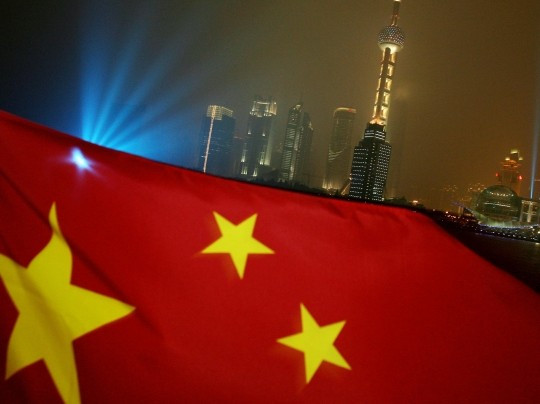Societe Generale Warns of China’s Economic Hard Landing Impact

Societe Generale has warned investors not to dismiss concerns over a hard landing in China and said its effects on global financial markets could slash economic growth by more than half.
In its report, What If China Lands Hard, SG revealed the detrimental impact on global GDP and a variety of asset classes should China's growth rate slow to below 6 percent, which it sees as the minimum level needed to keep the job market stable and avoid systemic financial risk.
"China is enjoying a cyclical recovery and worries about a hard landing have dropped down investors' list of global concerns. This could be a mistake," says Patrick Legland, head of research at SG [Chart 1].
"The Chinese economy is still imbalanced: almost half of GDP comes from gross fixed capital formation, up from slightly more than a third in 1997. Indeed, the reliance on investment has become more pronounced in recent years, even though the contribution to GDP from net exports has dropped steadily since 2008."
![[Chart 1]](https://d.ibtimes.co.uk/en/full/333946/chart-1.jpg?w=736&f=6e7ea7ee34041cfcc7bba9fac488d4a3)
It adds that a hard landing could lead to negative price effects on a number of asset classes, including a 50 percent drop in base metals prices and even a 30 percent fall in Brent crude oil prices.
While SG economists forecast the Chinese economy to grow by 7.4 percent in 2013, after a cyclical rebound since the beginning of the fourth quarter 2012, it believes this recovery will not last until the early mid-point of this year and then gradually lose momentum.
"In the medium term, we still anticipate a bumpy path of secular deceleration, leading to an average growth rate of 6-7 percent over the next five to seven years, down from 10 percent per annum over the last three decades. As China undergoes demographic ageing and growth of the working-age population slows, this minimum stable growth level will decline further," says Wei Yao, chief economist at SG.
"However, if progress in rebalancing and structural reform remains slow, the probability of a hard landing will rise over the medium term. In the tail risk scenario set out below, 2013 will see several quarters with just 3 percent growth and full year growth would stand at just 4.2 percent," she adds.
Triggers and the Evolution of a Hard Landing
According to a survey conducted as part of its 'What If China Lands Hard' report, SG polled 70 clients across the US, Europe and Asia and found a consensus figure of 8.1 percent for China's 2013.
While SG's clients, which include hedge funds, fund managers and banks, are consistent in their forecasts for China's GDP growth rate, in the reposnse to the worst reasonable case for how low growth will be this year, nearly two thirds forecasted 5.5 to 7 percent.
However, SG warned that a hard landing could become a reality, following two main trigger points.
"First, the experience of 2008 showed that the Chinese economy is vulnerable to trade shocks. The Lehman crisis made exports go into reverse, resulting in the loss of nearly 50m migrant worker jobs in the two quarters after it took place," says Yao.
"Second, a hard landing could be provoked by either insufficient public investment from Beijing or a sharp property market correction, which could also be partly induced by tight policies," she adds.
SG also warned that 'whatever the catalyst,' the excess capacity in the manufacturing sector, estimated at 40 percent in 2011 by the International Monetary Fund would be exacerbated by a sharp growth slowdown [Chart 2].
"This would cut corporate margins sharply, making profits plunge, and triggering a downward spiral in domestic demand. Bankruptcies and unemployment would occur on a large scale, endangering financial and social stability," says Yao.
"One factor that could accelerate the downward spiral is the high leverage of China's corporate sector, which exceeded 120 percent of GDP at end-2011 and has kept rising throughout 2012. As the crisis progressed, non-performing loans would undoubtedly rise beyond the capacity of local governments to contain them, as their fiscal resources dwindled," she adds.
![[Chart 2]](https://d.ibtimes.co.uk/en/full/333947/chart-2.jpg?w=736&f=84a7818b6d5e706c97a72dd2f85030a0)
Global Ripple Effects
If China were to experience a hard landing, SG warns that this could cut global GDP growth by 0.6 percent while the spill-over effects in Asia and the rest of the world could cut the figure to trim global GDP to 1.1 percent from 2.7 percent.
The effects China would have on the commodities market would also be significant, as the country's commodity intensive growth since 2000 has made it a major driver in this sector and the dominant influence on base metals.
"A Chinese hard landing would not only directly reduce demand for commodities, it would also hugely undermine investor confidence in the asset class, exacerbating fundamentally-driven price moves," says Dr. Michael Haigh, head of commodities research at SG.
While Haigh warns the commodities analysis must be used with caution, as prices can drop below marginal costs temporarily and commodities react in different ways to these floors, SG says that there could be a 50 percent drop in base metals and a 30 percent decline in Brent oil prices, should a Chinese hard landing occur.
SG also adds that gold prices would rise sharply, but then then drop just as quickly.
Moreover, Paul Jackson, equity strategy analyst at SG says that European equities could fall by as much as 20 percent under a China hard landing.
Meanwhile, SG's Asia rates strategist Wee-Khoon Chong argues that interest rate swap levels would fall to historic lows across the region and would lead to a bull steepening in the curves, with more limited declines in long rates, and would also lead to narrower swap spreads as worries about credit controls drive global investors out of local government bond markets.
© Copyright IBTimes 2025. All rights reserved.






















